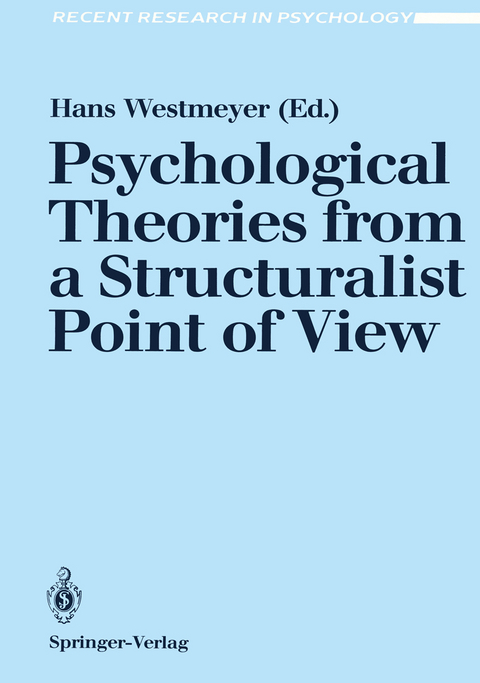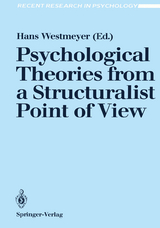Psychological Theories from a Structuralist Point of View
Springer Berlin (Verlag)
978-3-540-51904-1 (ISBN)
1. Psychological Theories from a Structuralist Point of View: A First Introduction.- What is Structuralism?.- Central Concepts of the Structuralist Approach.- Applications of the Structuralist Program in Psychology.- References.- 2. A Reconstruction of Sigmund Freud's Early Theory of the Unconscious.- Freud's Basic Picture.- Potential Models and Models.- Neurosis.- Constraints, Links, Measuring Models.- Intended Applications.- Empirical Claim and Confirmation.- References.- 3. Festinger's Theory of Cognitive Dissonance: A Revised Structural Reconstruction.- The Basic Element.- A Theory-Net.- Theory and Experiment.- References.- 4. A Net of Psychological Utility Theories.- The Theory-Net.- Concluding Discussion.- Technical Appendix.- References.- 5. Anderson's Theory of Cognitive Architecture (ACT*): Towards a Structuralist Reconstruction of Some Important Theory-Elements.- The Basic Element.- An Experimental Element.- The Central Element.- A Preliminary Theory-Net.- References.- 6. Structuralism as a Method of Theory Construction: The Example of the Social Psychological Role Conflict Theory.- Some General Methodological Notes.- The Role Conflict Theory.- The Generalization of the Role Conflict Theory.- General Conclusions.- References.- 7. The Theory of Behavior Interaction: A Structuralist Construction of a Theory and a Reconstruction of its Theoretical Environment.- Basic Concepts and Assumptions of the Theory.- Theory-Element "Behavior Interaction".- Theory-Element "Behavior Interaction in Small Groups".- Theory-Element "Behavior Interaction in Dyads".- Theory-Element "Behavior Interaction in Triads".- Links to the Theory of Behavior Interaction.- Theory-Element "Indifference Structure".- Link to the Theory of Indifference Structures.-Theory-Element "Coding Structure".- Link to the Theory of Coding Structures.- Theory-Element "Observation Structure".- The Theory of Behavior Interaction as Part of a Theory-Ho1on.- References.- 8. Interruption of Action and Stress: A Structuralist Approach.- Intended Applications.- Basic Theory-Element.- Potential Models and Models Concerning Stress by Waiting Times.- Variability Hypothesis.- Variability Hypothesis and Exponential Distributions.- Duration Hypothesis.- Theoreticity and Statistical Testing.- Appendix: Proofs of the Theorems 3, 8, 9, 14, 15, and 25.- References.- Author Index.- List of Contributors.
| Erscheint lt. Verlag | 28.11.1989 |
|---|---|
| Reihe/Serie | Recent Research in Psychology |
| Zusatzinfo | XIII, 213 p. |
| Verlagsort | Berlin |
| Sprache | englisch |
| Maße | 170 x 242 mm |
| Gewicht | 425 g |
| Themenwelt | Geisteswissenschaften ► Psychologie ► Allgemeines / Lexika |
| Geisteswissenschaften ► Psychologie ► Allgemeine Psychologie | |
| Sozialwissenschaften ► Soziologie ► Empirische Sozialforschung | |
| Schlagworte | Freud • Freud, Sigmund • philosophy of science • Psychological Theories • Structuralist Approach • Strukturalismus • Theoretical Psychology • The Unconscious |
| ISBN-10 | 3-540-51904-1 / 3540519041 |
| ISBN-13 | 978-3-540-51904-1 / 9783540519041 |
| Zustand | Neuware |
| Haben Sie eine Frage zum Produkt? |
aus dem Bereich




